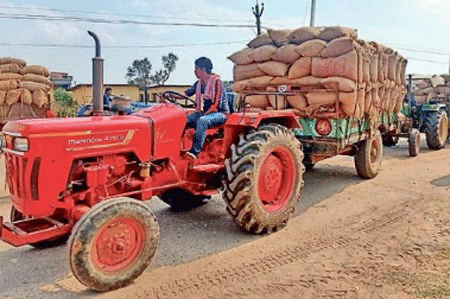Sambalpur: Farmers in Sambalpur, a key agricultural hub in Western Odisha, since 8 June resorted to widespread road blockades, expressing their fervent anger over chronic delays in paddy procurement and the devastating damage caused to their harvested produce by recent unseasonal rains. This latest agitation underscores a deeply entrenched crisis in Odisha’s paddy procurement system, which farmers across the region have consistently highlighted.
The immediate trigger for yesterday’s protests was the significant backlog of paddy-laden trucks awaiting unloading at various mandis (procurement centers). Farmers reported that their harvested paddy, painstakingly brought to the centers, has been left stranded in the open for days, becoming increasingly vulnerable. The recent spell of unseasonal rainfall, which has affected many parts of Western Odisha including Sambalpur, proved to be the final straw. Paddy bags exposed to the elements quickly absorbed moisture, leading to discoloration, quality deterioration, and rendering them unfit for sale under Fair Average Quality (FAQ) norms. This directly translates to substantial financial losses for the already struggling farmers.
“We have been waiting for days, even weeks, for our paddy to be lifted,” lamented Suresh Pujari, a farmer from a village near Sambalpur. “Now, with these unexpected rains, our hard work has literally washed away. Who will compensate us for this loss?”
Root Causes of the Recurring Crisis:
The issues plaguing paddy procurement in Odisha are multifaceted and have been the subject of frequent farmer protests across Western Odisha. The key grievances include:
- Persistent Delays in Paddy Procurement and Unloading: Despite the government’s efforts, farmers often face agonizing waits at mandis. Insufficient number of procurement centers, inadequate storage infrastructure, and logistical bottlenecks in lifting the procured paddy contribute to this delay. Millers, who play a crucial role in the procurement chain, are often cited as a reason for slow lifting, at times allegedly to pressure farmers into accepting lower prices or deductions.
- Disputes Over Paddy Quality Testing: The introduction of digital analyzer machines for quality testing, while aimed at transparency, has drawn criticism from farmers. They allege that these machines are often unreliable and that the strict FAQ norms applied by these machines often result in unwarranted deductions (“katni chhatni”) for moisture content or foreign particles, even for good quality paddy. Farmers argue that this practice is exploitative and significantly reduces their rightful earnings.
- Non-Payment or Delayed Payment of Crop Insurance Claims: Despite the existence of crop insurance schemes, farmers frequently complain about the lack of timely and adequate compensation for crop losses due to natural calamities. The bureaucratic hurdles and lengthy assessment processes often delay the disbursement of claims, leaving farmers in dire financial straits, especially after losing their harvest to adverse weather like the recent rains.
The ongoing procurement crisis and rain-induced damage have pushed many farmers to the brink. They are burdened by loans and face uncertainty about their livelihoods. The road blockades in Sambalpur, a common form of protest in the region, aimed to draw immediate attention to their plight and demand swift action from the state government.
Farmers’ organizations in Sambalpur and other parts of Western Odisha have consistently demanded:
- Expedited and transparent paddy procurement with adequate infrastructure.
- Decentralization and simplification of the token system to make it farmer-friendly.
- Re-evaluation of paddy quality testing methods and an end to arbitrary deductions.
- Timely assessment and disbursement of crop insurance claims.
As the agricultural season progresses and more paddy arrives at the mandis, the pressure on the government to address these long-standing issues effectively will only intensify, potentially leading to further farmer agitations across the state. The livelihoods of thousands of farmers hinge on a more efficient and equitable procurement system.


